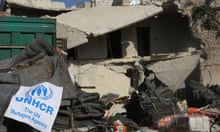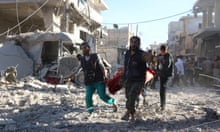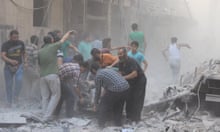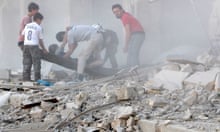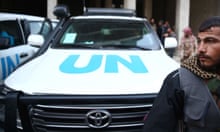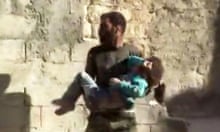Airstrikes by forces loyal to the Syrian government have bombed out of service the two largest hospitals in besieged eastern Aleppo, which serve a quarter of a million civilians, in what doctors have described as a catastrophic campaign that is testing the conscience of the world.
“You cannot imagine what we see every day: children who are coming to us as body parts. We collect the body parts and wrap them in shrouds and bury them,” said Bara’a, a nurse at one of the affected hospitals, who was present during the bombings.
Syrian hospitals under attack
Hospitals and doctors have been routinely targeted in the course of the war in Syria. The UN's commission of inquiry into the Syria crisis has long concluded that health facilities are being systematically attacked by government forces, which consider hospitals in opposition areas to be illegal and a legitimate military target. Physicians for Human Rights, an NGO, has identified 382 attacks since the start of the war on hospitals, more than 290 of which were carried out by the Syrian regime and at least 16 by Russian forces.
“Tell the world to wake up, to wake their consciences. Where are you? When Palestine was being destroyed everyone got involved. Why are Syria’s children being forgotten? Nobody is doing anything to reduce this suffering.”
The M2 and M10 hospitals, codenames used by local doctors to obscure the locations of the facilities, were hit at about 4am, and the former again at about 10am, by airstrikes and artillery shells. This is the latest development in a week-long offensive that one health official has described as “catastrophic and unprecedented in modern history”.
The latest assault on Syria’s doctors was only the most recent outrage in a campaign NGOs describe as systematic and deliberate. It came on the heels of a violent week in Aleppo, during which nearly 400 people have been killed and hundreds more injured, as forces loyal to Bashar al-Assad’s regime prepare a ground offensive to reclaim the opposition-held east of the city.
In New York, as the UN security council gathered on Wednesday to discuss the protection of medical workers in times of conflict, the outgoing UN secretary-general Ban Ki-moon made his most direct accusation of war crimes so far against Russia and the Syrian regime.
“Those using ever more destructive weapons know exactly they are doing. They know they are committing war crimes,” said Ban, who ends his 10 years in the post in December. “Imagine the destruction. People with their limbs blown off, children in terrible pain with no relief... Imagine a slaughterhouse. This is worse. Even a slaughterhouse is more humane.”
Zaher Sahloul, a senior adviser for the Syrian American Medical Society, which supports both of the hospitals bombed overnight, said: “It is extermination of a major city by starving and killing its 85,000 children using all modern and middle ages weaponries.”
In a statement, Unicef said at least 96 children had been killed and 223 injured in eastern Aleppo since Friday after a ceasefire brokered by Washington and Moscow broke down in mutual recrimination.
“The children of Aleppo are trapped in a living nightmare,” said the Unicef deputy chief, Justin Forsyth. “There are no words left to describe the suffering they are experiencing.”
Health workers said the 4am attacks at the M2 killed two staff members and a civilian whose heart was pierced by shrapnel. The hospital’s intensive care unit was extensively damaged, as were power generators, fuel storage and water tanks that kept the hospital running. Damage was also sustained by an ambulance that had replaced another that was destroyed in a bombing two days ago.
Medics took shelter in the hospital basement during the mid-morning attack, sending calls for aid as they hid until government planes had retreated.
“If the hospital falls on top of us, come pull us out from under the rubble but do not take pictures,” said Bara’a, the M2 nurse, in a message from the shelter to a discussion group of journalists and doctors in eastern Aleppo. “Please don’t take pictures; we won’t gain anything from it and our dignity is too precious.”
There are only 30 doctors remaining in eastern Aleppo. They have condemned what they describe as a systematic campaign of destruction against doctors and medical facilities and say they have been abandoned by the international community.
“People here now consider themselves dead and are just counting the days,” said Anwar Shehade, an anaesthetist. “I am lucky if I survive until the night, but I am sure that I will die, if not today then tomorrow for sure.”
Doctors say medicine is running out and hospitals are overwhelmed by the number of wounded, which civil defence rescue groups estimated at 1,700 people. At the M2 hospital, a fresh wave of victims in the late afternoon had to be sent to another hospital farther away because they could only provide them with basic first aid.
“These bombings are systematic and direct against hospitals that are serving besieged Aleppo,” said Mohammad Abu Rajab, a doctor at the M2. “Today we are saddened. Grief has filled the faces of all the doctors because we can no longer treat these patients. We pray to God that we are able to work again.”
Joanne Liu, the head of Médecins Sans Frontières, which supports both hospitals, described the joint Russian and Syrian aerial campaign against Aleppo as a sign of the new limitless nature of warfare.
“The conduct of war today is ever boundless. It is a race to the bottom,” she said at a UN security council session. “The unremitting assault on Aleppo by Russian and Syrian forces over recent days is certainly testament to that.”
In a week of what residents have described as the worst airstrike campaign since the start of the civil war in Syria, forces loyal to Assad have begun the early stages of a ground offensive aimed at reclaiming eastern Aleppo, which has been under opposition control since 2012.
A brief ceasefire negotiated by Washington and Moscow collapsed last week. Since then, more advanced weaponry, such as bunker-buster bombs, have been dropped on the east of the city, which has been under siege for three months.
A victory in Aleppo would allow Assad to lay claim to most of Syria’s heavily populated urban centres, while relegating the rebellion to a rural insurgency.
The US secretary of state, John Kerry, said on Wednesday that Washington would no longer negotiate with Moscow if it did not stop the bombardment.
The state department said: “He informed the [Russian] foreign minister that the United States is making preparations to suspend US-Russia bilateral engagement on Syria – including on the establishment of the joint implementation centre – unless Russia takes immediate steps to end the assault on Aleppo and restore the cessation of hostilities.”
However, there has been no significant bilateral engagement since the offensive on eastern Aleppo began. US officials acknowledge they have very little leverage left as it is highly unlikely that Barack Obama would reverse course and threaten military action against the Assad regime in the last three months of his administration.
Some had hoped that the prospect of a military partnership in Syria with the US, as well as fear of being sucked into perpetual conflict, would be sufficient incentive for Moscow to stick to the ceasefire deal. That is now seen in the state department, White House and Pentagon, as wishful thinking. Local people say the conduct of the campaign has gone beyond anything they have seen since the start of the war. “I just want the world to know that in here are people calling for help, there are children, human souls,” said Bara’a. “There are children dying of no fault of their own.”


